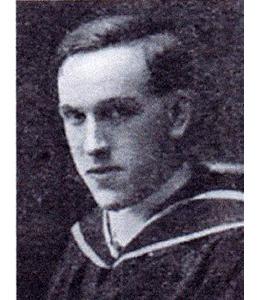Killed in action aged 24
Buried at Chester Farm Cemetery, Zillebeke, West-Vlaanderen, Belgium Plot: I. F. 4.
Frederick Alexander was born in Huntley, Aberdeenshire, the third son of Hugh Rose, a builder in Huntley, and his wife, Jean Mellis.&
He was educated at the Gordon Schools, Huntley and entered Aberdeen University.
in 1907 as a Second Bursar. He graduated M.A in 1911 with First Class Honours in English. He acted as an assistant in English for a year before coming up to Christ Church in 1911 having won the Douglas Jerrold Scholarship.
Whilst an undergraduate, he gained the Charles Oldham University Scholarship with a paper on Shakespeare. He graduated with First Class Honours in 1913, was elected to a Post-graduate Scholarship, and was beginning to prepare his thesis on Fulke Greville, Lord Brooke, when war broke out.
He joined the Officers Training Corps and was gazetted to the 3rd Gordon Highlanders as a Second Lieutenant. In the early summer of 1915, he was ordered to join the 4th Battalion in France. A few weeks later, whilst the line was being heavily shelled, he came out of the dugout in which he was resting, to steady and encourage his men, when he was struck and killed by a bursting shell.
The Roll of Honour Aberdeen University: “So died a very fine gentleman, modest, courageous, honourable who would, had he lived, have become a great scholar for he had all the natural aptitudes and was training himself, patiently, in the fine discipline which alone can produce that rare thing, the genuine scholar and critic.”
Aberdeen University Review
Frederick Alexander Rose (M.A., 1911; B.A. Oxon.), Lieutenant, 4th Gordon Highlanders, was killed in action in Flanders on 11 August.
He belonged to Huntley, and had a distinguished career at the University, graduating with first-class honours in English, and winning the Seafield Medal and the Minto Memorial Prize. He gained a scholarship for Christ Church, Oxford; gained the Charles Oldham Shakespeare Scholarship open to the University; at graduation was placed in Class I of Final Honour, School of English Language and Literature; and was elected to the Dixon Research Scholarship. The last of his many academic achievements was to win the Matthew Arnold Memorial Prize at Oxford for an essay on "The Supernatural Element in Icelandic Literature".
In a letter in the "[Aberdeen] Free Press" (17 August) Professor Grierson described Mr. Rose's career as one of the greatest promise, and said that, in the preparation of his edition of Donne's Poems, he had received invaluable assistance from Mr. Rose, both in the collation of manuscripts and the correction in detail of difficult proofs.
"Throughout last winter," added Professor Grierson, "Mr. Rose was busy preparing to edit himself the difficult poems of Fulke Greville, Lord Brooke, the friend of Sir Philip Sidney. He had already made most interesting discoveries as to the bibliography of the volume and the sources of his work."


